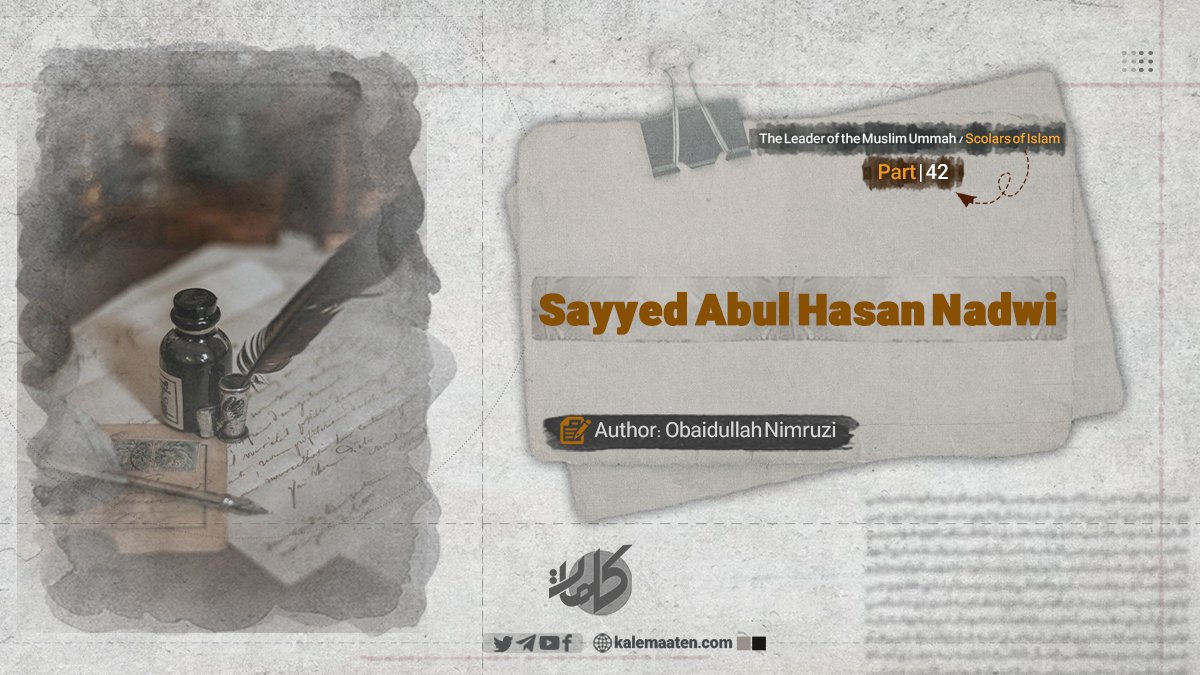
Author: Obaidullah Nimruzi
Allama Sayyed Abul Hasan Nadwi ‘May Allah Have Mercy on Him’ (Part 42)
The Spiritual Moments of Allama Nadwi’s Life (May Allah Have Mercy on Him)
Factors of Privilege and Acceptability at a Glance
Sheikh-ul-Islam Mufti Muhammad Taqi Osmani (May Allah Have Mercy on Him), in one of his speeches in Dewsbury, England, listed some of the success factors of Imam Nadwi (May Allah Have Mercy on Him):
1. He believed that Hazrat Imam Nadwi (May Allah Have Mercy on Him) did not learn science merely for the sake of knowledge but acquired it to act upon it. He benefited the world through the insights gained from his knowledge. Imam Nadwi (May Allah Have Mercy on Him) was endowed by Allah with such knowledge that incorporated the spirit of science—humility, simplicity, piety, and striving for the Ummah.
2. The blessings observed in various corners of the world from Hazrat Imam Nadwi (May Allah Have Mercy on Him) are not just the result of scholarly knowledge but also the effectiveness and acceptability stemming from his fervent heart and compassion. After obtaining knowledge to improve and cultivate the inner self, he humbly knelt before the great scholars such as Mawlana Ahmad Ali Lahori, Hazrat Mawlana Hussain Ahmad Madani, Hazrat Mawlana Shah Abdul Qadir Raipuri, and Hazrat Mawlana Muhammad Ilyas. Hazrat Imam Nadwi (May Allah Have Mercy on Him) was always concerned about the reform of the Ummah, which is why he sought connection rather than isolation.
3. Hazrat Imam Nadwi (May Allah Have Mercy on Him) did not identify himself with any particular group or party; rather, he cooperated with all Islamic parties and groups. This openness meant that no group could claim sole ownership of him; his relationships were not exclusive, and he believed in inclusivity.
4. Hazrat Imam Nadwi (May Allah Have Mercy on Him) blended truth-telling and fearlessness with wisdom and benevolence. Almighty Allah granted him a unique insight to articulate the right words in the right contexts, ensuring that his expressions did not incite sedition. Hazrat Imam Nadwi (May Allah Have Mercy on Him) avoided factionalism and had no intent to form a party under his name. No one can deny that his name has historically featured prominently among the advocates of truth, and his revolutionary call made positive impacts on both Arab and non-Arab communities. He never associated his invitation to Islam with theories that were distant from the consensus of the majority of scholars in the Ummah, instead remaining steadfastly aligned with the Ummah.
5. Sheikh-ul-Islam Mufti Muhammad Taqi Osmani has highlighted additional characteristics of Imam Nadwi (May Allah Have Mercy on Him): Some individuals, in seeking to address new needs and demands, have chosen paths diverging from the consensus of Ummah scholars, deriding those who adhere to traditional paths as ignorant of contemporary situations. However, no one could cast such aspersions upon Imam Nadwi (May Allah Have Mercy on Him), as he was well aware of contemporary realities without deviating from the consensus of the Ummah.
Another epidemic that has become widespread among some individuals is the presumption that expertise in one field of Sharia qualifies them to opine on all matters, even those requiring specialized knowledge and understanding. This has led to opinions contradicting longstanding Sharia laws and principles, fostering discord rather than unity. Although Hazrat Mawlana Nadwi (May Allah Have Mercy on Him) possessed a profound understanding of multiple disciplines—including literature, history, commentary, and hadith—he had also studied jurisprudence under distinguished scholars. Throughout his life, he exercised great care regarding jurisprudential matters. His approach was to remain aligned with the consensus of the Ummah and avoid causing discord through personal opinions, advocating a path of moderation. This article does not suggest that Mawlana practiced flattery; rather, he was unafraid to speak the truth. He authored a book addressing the blasphemous beliefs of the Qadiani sect and articulated the truth clearly.
Continues…


